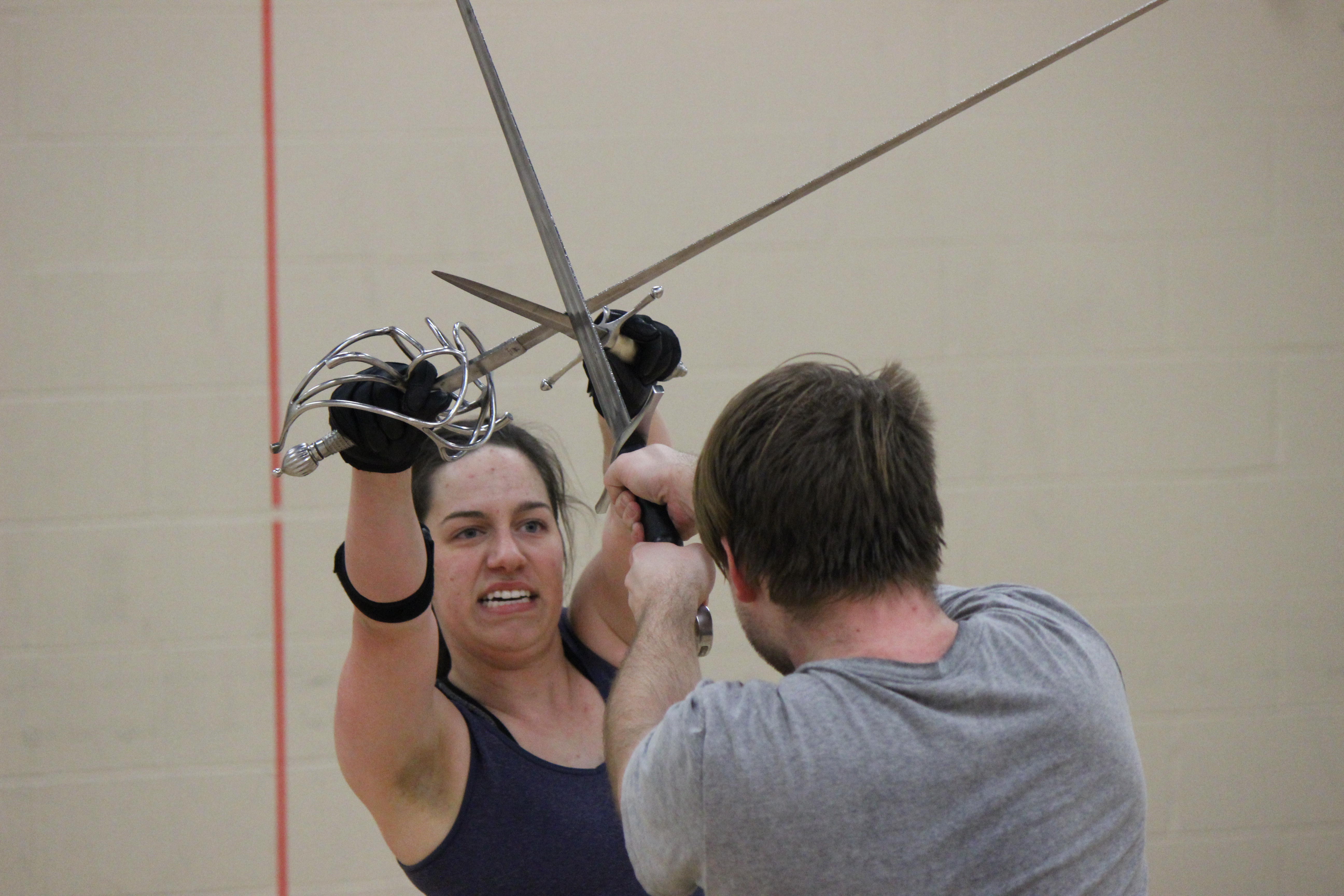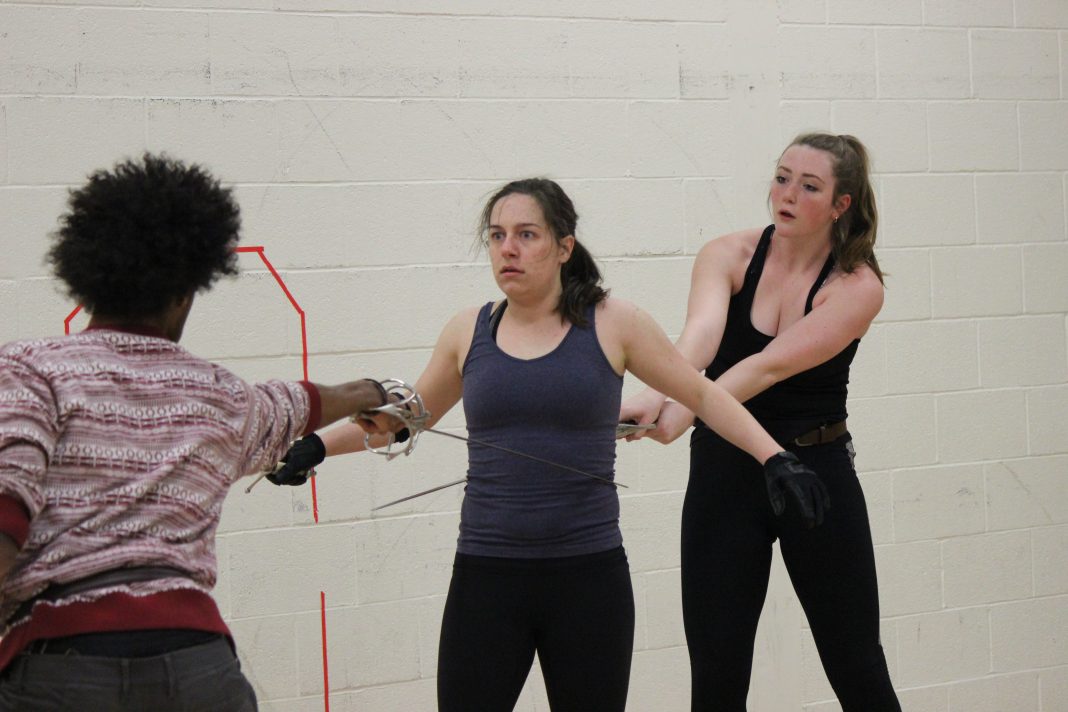I crack open the door of the Dance Studio Theater and am immediately greeted by the sound of booming voices somehow echoing inside of this confined, acoustically absorbent place. I sneak inside, gingerly placing my backpack in the back corner and sliding to the floor amid unused props and sticky notes. Before me, the room is full of actors in full performance mode, despite the fact that their only audience consists of directors, stage managers, and other members of the cast and crew – music reverberates underneath the players’ passionate speech as Shakespearean language easily drips from their tongues, each step they take full of purpose and intention.
Glory, an adaptation of the bard’s Henry VI tetralogy written and directed by associate theatre professor Holly Cate, is in its final stages of rehearsal. Though weeks still stand between the performances on April 5 through 8, those who have been working on the show for the past few months are certainly not wasting any time. As I observed their run-through on Sunday night, the performers did not stop once, acting as though it were opening night through their everyday clothes and makeshift props.
Unlike many other works that appear on the Muhlenberg mainstage, this show has no previous incarnations to invoke or draw inspiration from: the college’s production marks the first full staging of Glory. Assistant director Sophia Castell ’20 believes that this sense of exploration lends itself to the show’s uniqueness.

“It’s really been interesting working on a new show. Building the world of Glory from the ground up has been a really rewarding experience,” Castell said. “I’ve enjoyed seeing the work that everyone has done come together in such a meaningful way.”
Though I did not see the show rehearsed on the Empie stage where it will eventually be performed, the playfulness between setting and content that emerges from the cast and crew’s imaginative work is clear. At one point, many of the actors gathered on stage and performed a kind of slapstick battle sequence with sticky note roses, pulled from coatracks standing in for the six-foot-tall rosebushes that currently occupy Empie theatre. The fact that the final props were not available to the actors did nothing to faze them, and the fight proceeded with such enthusiasm that I could easily imagine real roses in their hands.

Beyond these traditionally Shakespearean elements, Holly Cate’s adaptation includes dialogue and action changes that modernize the story, as well as introducing a driving, contemporary soundtrack that sometimes complements and sometimes humorously contrasts the action on stage. According to Laine Flores ’20, who plays Joan, these updates are what invite the audience into the world of the play.
“The show is very Game of Thrones-esque, following multiple plot lines and characters throughout. The stakes are very high, and the politics are very personal,” said Flores. “I think that Glory is different from other mainstages because of the world it takes place in. It’s something that our cast and our production team have built together from the foundation that Holly laid for us with her script. It’s a strangely beautiful and violent world, filled with dangers and with the incredibly human characters that navigate around those dangers. We’ve had this wonderful opportunity to play together and create something unique that makes us ask a lot of questions about humanity, war, and what it means to be on the ‘winning side’ of history.”
Interestingly, much of the campus discourse around Glory has centered around its inclusion of nudity – when mainstage auditions rolled around last semester and hopeful actors were invited to sign up, they were asked how much they would be comfortable displaying on stage. Thus, the show became associated with an absence of clothing, discussed in hushed and even somewhat concerned tones both within and outside of the theatrical community.
However, my experience of the show (at least in seeing the first act) is much closer to what Flores describes: it is a complex, multilayered piece that contains many different elements in order to best accomplish the mammoth task of effectively telling this story, and if consensual nudity is one aspect of the art, it need not be treated as though it represents the show as a whole. There are comedic scenes facilitated by clowns, serious fight scenes filled with impeccably executed stage combat choreography, romantic scenes that hint at concealed love, and everything in between. As Flores said:
“ … It makes Shakespeare very accessible. The cast of clown characters is with the audience every step of the way, just as confused as you are, trying to piece together who’s Duke of which place, who’s sleeping with whom, and who’s organizing which murders. I know that sometimes people view heightened language as intimidating and are worried that they won’t understand what’s going on, but Glory bridges the gap between Shakespeare’s language and our modern English very nicely.”
The cast of characters is large, and the overarching plot even larger, but the performers’ acting and the clever movements of the set weave seamlessly through the narrative. Even if the words being said are difficult to understand, the actors’ tones make their intentions clear, and the careful direction of certain moments makes it clear when we should really be paying attention. For instance, there are several occasions on which everyone on stage suddenly moves in slow motion for a few seconds, allowing the viewer ‘s eyes to roam and really track what’s going on. On the opposite end of the spectrum, rapid-fire shouting matches between characters like those played by Xavier Pacheo ’19 and Lauren McGinty ’18 provide a clear sense of conflict and urgency even in their agonizing silences, each actor’s intensity on full display. The clowns solemnly echo Flores’s character as she shouts “Dulce et decorum est pro patria mori,” though they later confess they have no clue what it means.
Glory is certainly an adaptation that does not rely only on what the world’s most famous playwright has left behind. It stands on its own two feet, a new and lively work that is sure to inspire laughs, gasps and perhaps even a few tears from its audience members. Whether or not you believe Shakespeare is for you, you’ll be able to connect to some part of this epic narrative.






















